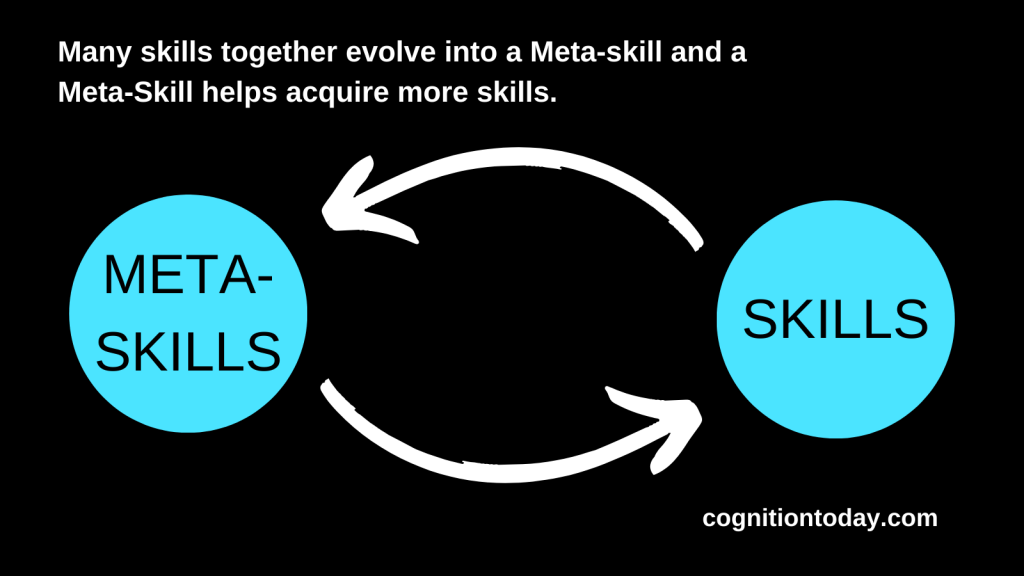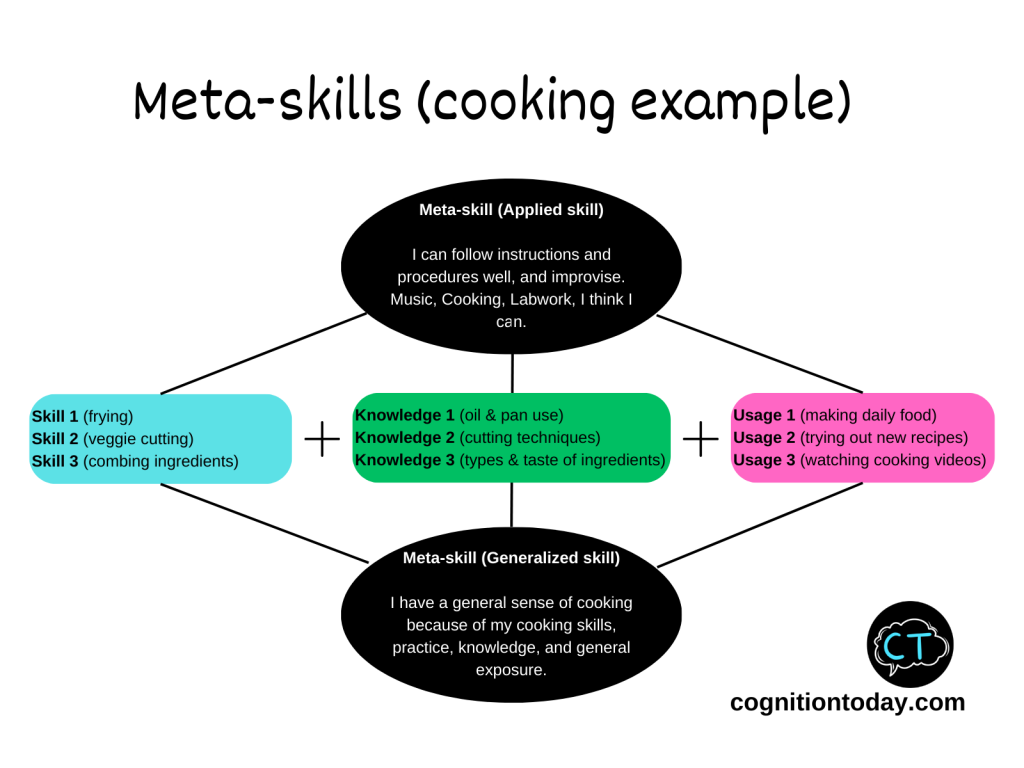For eons we have been a civilization that used skills to adapt and adjust. We used skills to alter our environment by building things. One small thing at a time. Now is an era where the rate of building is so technology-dependent, few things keep humans relevant. One of them is meta-skills. (read post-script).
A lot of work is done with AI assistance. A lot of work is done with machines that automate processes. What’s left for humans? Technology replaces basic skills. But humans have a place still, and it exists because of “meta-skills”.
Cutting wood? Machines do it. But, humans craft interiors. Making fried rice? Machines make the ingredients. Humans make the food unique and tasty. Writing email? AI does it. Humans add a personality to it. Building integrated chips? Machines manufacture. Humans write applications.
Even in the human-side processes, a lot of the skills are used with technology-assistance. At the rate we are improving technology, there is a shift in what human skills are getting valued and which ones are not.
New areas of study like “technology management” have emerged that prepares people to manage technologies. Humans are becoming managers of people, people with technology, and technology itself. That’s a meta-skill.
Meta-skills are harder to replace. They develop when the brain derives them from extensive human knowledge and micro-skills.
In consulting terms, meta-skills make a person a “deep generalist” and also a “highly adaptive executor“.
Or in management terms, they describe a person who has both A-shaped (deep technical knowledge) and T-shaped (breadth and depth) skills.
Meta-skills
Meta-skills[1] are derivates of a person’s overall skill set in a domain and higher-order skills that help in other domains regardless of context. The unique value of those meta-skills is beyond what technology offers today. Learning vocabulary and good grammar would be a hard skill, but using it appropriately for general communication in any context would be a meta-skill. When technology can anyway give you words and even live translations, knowing what to speak and what to ask for becomes a conversational meta-skill.
Research is a meta-skill of searching for information on top of the hard skill of knowing how to Google well. Learning how to learn ideas are meta-skills that are applied to studying a particular topic.
Meta-skills also refer to higher-order skills you learn while solving problems. For example, planning is a meta-skill that develops through various experiences in planning trips, meetings, house parties, etc. Using specific chess moves and knowing how to use those moves as a metaphor in business is also a meta-skill. These skills, or their versions, can be useful in different areas.
However, the word meta-skills is also interchangeably used with metacognition depending on the context. For example, on LinkedIn, posts about meta-skills could refer to high-level business management skills. In the learning sphere, meta-skills would refer to methods of reflecting on what one learns (essays, commentary, self-reflection, hypotheticals, etc.) Generally, the most common meta-skills described in most domains are about are planning, evaluation, passing judgment, decision-making, monitoring, strategizing, and execution. But there is more (next section).
These skills get valued more because they are quite uniquely human (for now) and using technology for micro-functions becomes a more feasible option, economically speaking.
Let’s formalize these meta-skills now.
- Meta-skills can be learned independently, but they are best learned within a context and during improving skills in a broad area like cooking or coding.
- Meta-skills manifest in 2 types: Highly generalized skill, Highly applied skill
1. Highly Generalized Skill (like a Deep Generalist)
When you perform a skill long enough, with enough variations in it, and enough regular exposure, the brain abstracts and aggregates the knowledge and micro-skills into a large generalized skill-set. At this level, a person is able to easily use a skill in a new context, with new constraints, with new objectives, and for new problems.
The very reason why LLMs like ChatGPT got popular are because they have a generalist skill-set – can do a lot of things pretty well. But I think that when a human gets to that state, the generalist becomes a deep generalist. Plus, the burden of training a generalist AI (or any technology) is very high, so that gives humans the advantage (for now).
E.g., Guitar playing, teaching science, writing fiction, academic research, navigating airports, etc.
2. Highly Applied skills (like a CEO)
When you learn a skill, there is a so called “Chief Executive Officer” skill that governs and overlooks that skill. Learning how to learn is a CEO skill that governs learning a language or pottery. The CEO skill creates a strategy and a broad overview about what to do to acquire a skill. Applied skills are related but not representative of a skill. This aspect of a meta-skill goes beyond a domain and helps in out-of-context unfamiliar domains. E.g., a meta-skill from cooking can be applied to lab work from the point of view of understanding and following procedures. Similarly, the process of coding can be applied to writing a good story by understanding different modules (story arcs) and functions (story events).
E.g., Planning, resource budgeting, communication, team work, attention to detail, etc.
This application, or transference of a skill, happens because of an intermediary meta-skill. E.g., doing a lot of research can make a person better at researching a different topic, because the “research” skill has developed and now been applied to a new domain. This applicability or a derivative of a skill allows a person to still have control over their own domain and make decisions, even if a specific skill gets replaced by technology.
Both these aspects of a meta-skill make a person adapt well to changing job requirements and adjust to new developments in an area. Meta-skills create flexibility in one’s area of expertise.
The main advantages of meta-skills
Meta-skills are themselves built out of acquiring other skills. But their core value lies in how they help us acquire more and more skills. This is a positive feedback loop between skills and meta-skills.
Psychologists have described a “far-transfer effect[2]” – learning a skill directly benefits learning another unrelated skill. (the near-transfer effect applies to related skills).

For example, learning good file management skills during a computer programming job, can directly help in doing a creative management job that requires managing creative assets and categorizing them well for asset transfer.
This far-reaching ability makes humans very flexible in solving problems and gaining new skills to solve more problems. And when technology threatens the value of some skills, meta-skills acquire new skills that keep the human relevant and make the human fit to do perform jobs that are not under threat from technology’s replacement spell.
Meta-skills make us resilient and give as the “unfair advantage” over technology. Researchers who study meta-skills[3] say students need meta-skills like interpersonal communication and time-management, intellectual aspects like decision-making and reasoning, personality aspects like motivation and adaptability, and job-specific skills to have a competitive advantage.
Skills are context and job-specific, but meta-skills are not. They go beyond context and are highly valued across jobs and domains.
The birth of a meta-skill: Schemas
Learning how to learn (using memory techniques) to become a memory expert is a meta-skill. Learning how to learn for acquiring any new skill is also a meta-skill. For example, a person who loves history might develop a good memory for remembering dates and chronology. The same ability might help them remember OTPS or other numerical details if they think of them as dates. Meta-skills can also develop as a part of expertise that can be applied within a domain. For example, musicians learn typical structures of songs and develop memory systems to capture musical structures, which are generally helpful in learning more musical structures. These are memory “schemas” or “templates” or “filters” of musical meta-skills.
Schemas emerge from a large exposure to meaningful patterns in some domain. Like the musician who learns many patterns of chords. Like the chef who knows how to improvise and make food. Or the 10x coder who knows which libraries to deploy and come up with a tech architecture.
Getting started with meta-skills
In any job skill or topic of study, a combination of 3 things begin to develop expertise. But for now, let’s only look at the schema aspect of that expertise. And then these schemas turn into meta-skills.
The 3 things:
- Specific skills (individual techniques)
- Knowledge-base (technical knowledge, processes, examples, etc.)
- Skill usage (how a skill gets used in one’s personal or professional life)
These ensure that a person knows a variety of techniques, has technical knowledge, has practice, and has wide exposure to that skill and its context.
Meta-skills are a derivative of those that emerge by continuing to build the 3 – skills, knowledge, usage.

Where’s AI at?
Mark Zuckerberg recently[4] just announced that meta will build an open-source general artificial intelligence. In theory, that is supposed to be an AI that has meta-skills. But we are yet to find out if it can acquire meta-skills and skills as well as humans do, and can it really go human-expert-level deep and still manage to be a generalist in most jobs.
This means, can it really, on it’s own manage an entire company’s finances, and still be great at writing fiction? For now, when it comes to meta-skills, it is:
Humans: 1 AI: 0
P.S. A lot of things keep us relevant – procreation, lived experiences, anything sensory like fashion, food, and art, etc., but that’s a topic for another day.
Sources
[2]: https://psycnet.apa.org/buy/2002-01514-006
[3]: https://www.emerald.com/insight/content/doi/10.1108/et-02-2015-0013/full/html
[4]: https://www.youtube.com/watch?v=Vy3OkbtUa5k

Hey! Thank you for reading; hope you enjoyed the article. I run Cognition Today to capture some of the most fascinating mechanisms that guide our lives. My content here is referenced and featured in NY Times, Forbes, CNET, and Entrepreneur, and many other books & research papers.
I’m am a psychology SME consultant in EdTech with a focus on AI cognition and Behavioral Engineering. I’m affiliated to myelin, an EdTech company in India as well.
I’ve studied at NIMHANS Bangalore (positive psychology), Savitribai Phule Pune University (clinical psychology), Fergusson College (BA psych), and affiliated with IIM Ahmedabad (marketing psychology). I’m currently studying Korean at Seoul National University.
I’m based in Pune, India but living in Seoul, S. Korea. Love Sci-fi, horror media; Love rock, metal, synthwave, and K-pop music; can’t whistle; can play 2 guitars at a time.



























